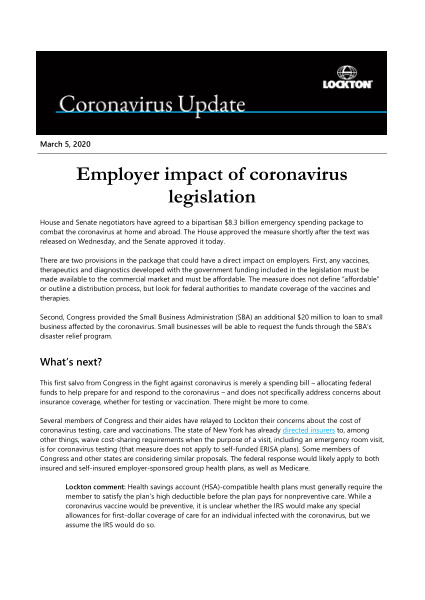House and Senate negotiators have agreed to a bipartisan $8.3 billion emergency spending package to combat the coronavirus at home and abroad. The House approved the measure shortly after the text was released on Wednesday, and the Senate approved it Thursday.
There are two provisions in the package that could have a direct impact on employers. First, any vaccines, therapeutics and diagnostics developed with the government funding included in the legislation must be made available to the commercial market and must be affordable. The measure does not define “affordable” or outline a distribution process, but look for federal authorities to mandate coverage of the vaccines and therapies.
Second, Congress provided the Small Business Administration (SBA) an additional $20 million to loan to small business affected by the coronavirus. Small businesses will be able to request the funds through the SBA’s disaster relief program.
What’s next?
This first salvo from Congress in the fight against coronavirus is merely a spending bill – allocating federal funds to help prepare for and respond to the coronavirus – and does not specifically address concerns about insurance coverage, whether for testing or vaccination. There might be more to come.
Several members of Congress and their aides have relayed to Lockton their concerns about the cost of coronavirus testing, care and vaccinations. The state of New York has already directed insurers (opens a new window) to, among other things, waive cost-sharing requirements when the purpose of a visit, including an emergency room visit, is for coronavirus testing (that measure does not apply to self-funded ERISA plans). Some members of Congress and other states are considering similar proposals. The federal response would likely apply to both insured and self-insured employer-sponsored group health plans, as well as Medicare.
Lockton comment: Health savings account (HSA)-compatible health plans must generally require the member to satisfy the plan’s high deductible before the plan pays for nonpreventive care. While a coronavirus vaccine would be preventive, it is unclear whether the IRS would make any special allowances for first-dollar coverage of care for an individual infected with the coronavirus, but we assume the IRS would do so.
While a coronavirus vaccine does not exist, it is in the process of being developed. Federal officials are concerned about ensuring access to the vaccine once it is ready. One option would be to ensure the vaccine is immediately included on the list of preventive care services the Affordable Care Act requires all nongrandfathered plans to cover without cost sharing.
The full legislative and regulatory response to the coronavirus remains in flux. However, there are clear indications that policymakers understand employers will play an important role in preventing and combating the disease. Lockton will continue to engage with policymakers and monitor the legislative and regulatory developments to keep you informed.
Lockton comment: We suspect the response to the coronavirus by businesses will also inform how Congress confronts other issues not related to the disease. For example, Congress is soon set to debate issues such as “Medicare for All,” paid leave requirements, surprise billing legislation and drug pricing. The response of businesses to the coronavirus will be fresh in the minds of policymakers as they debate these topics and sort out the balance of more regulation on businesses, expanded government programs and market-based solutions.
Not legal advice: Nothing in this Alert should be construed as legal advice. Lockton may not be considered your legal counsel, and communications with Lockton's Government Relations group are not privileged under the attorney-client privilege.
 View alert (opens a new window)
View alert (opens a new window)


